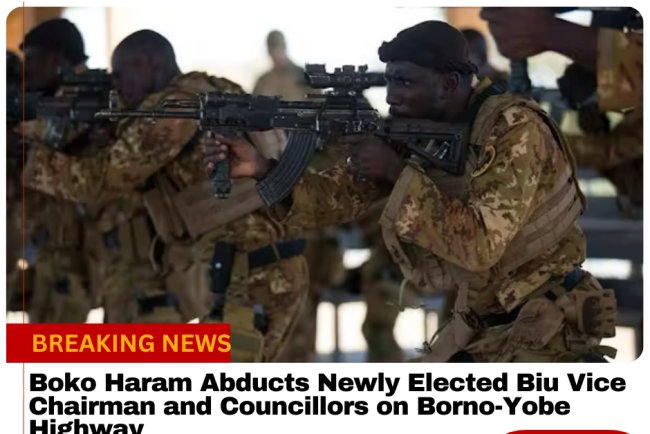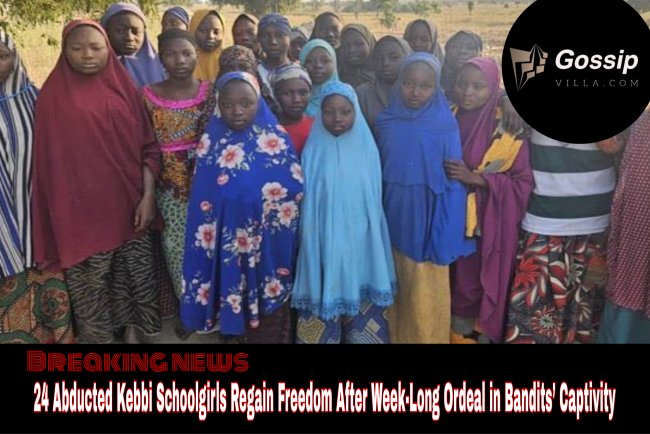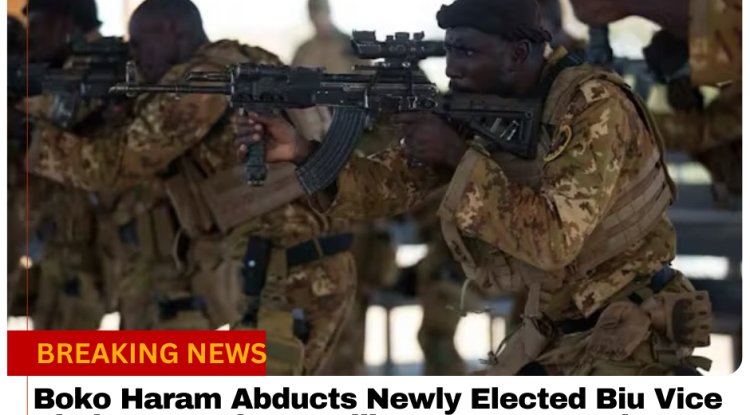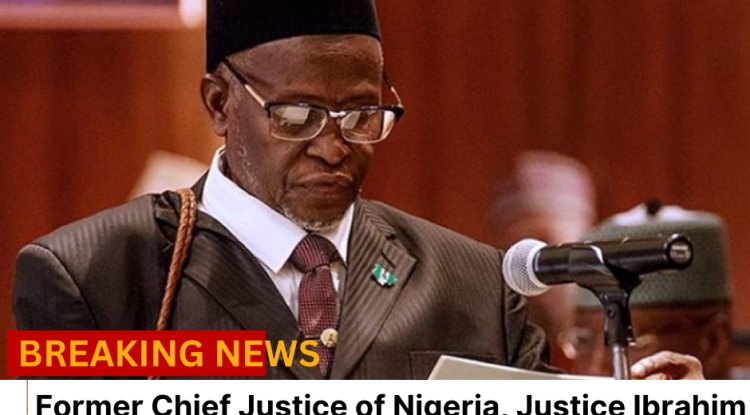Tinubu Appoints New Military Chiefs in Major Overhaul of Nigeria’s Armed Forces
President Bola Tinubu shocks Nigeria with a sweeping overhaul of military leaders, appointing new heads for Defence, Army, Navy, and Air Force.
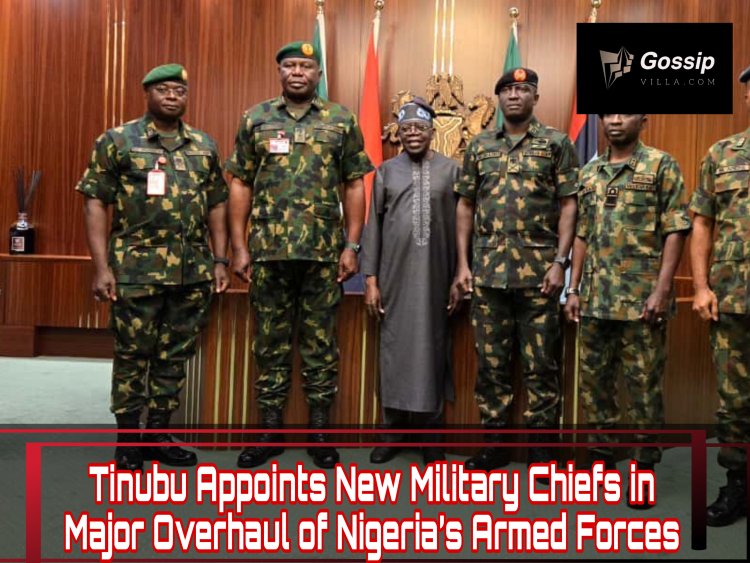
Tinubu Appoints New Military Chiefs in Major Overhaul of Nigeria’s Armed Forces
President Bola Ahmed Tinubu has replaced Nigeria’s top military service chiefs in what analysts describe as one of the most sweeping changes to the country’s security architecture in recent years. Announced on October 24, 2025, this move replaces key figures in the Armed Forces, Army, Navy, and Air Force, aiming to revamp Nigeria’s security strategy amid ongoing threats like insurgency and banditry. As tensions rise with recent coup allegations, this overhaul could redefine the nation’s defense posture. Let’s break it down step by step, from the announcements to the potential impacts.
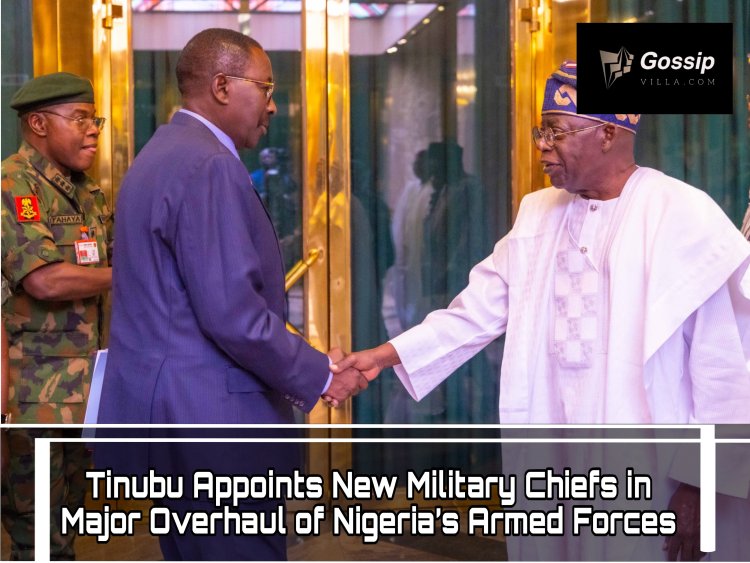
Background: Rising Security Pressures
This major shake-up comes at a time when Nigeria continues to face escalating security challenges. Insurgent activities by Boko Haram and ISWAP persist in the northeast, while banditry and mass kidnappings plague the northwest and central regions.
In the Southeast, renewed agitation for independence and the detention of Nnamdi Kanu, leader of the Indigenous People of Biafra (IPOB), have heightened tensions and prompted calls for political solutions rather than force alone.
The Announcement: Tinubu’s Clean Sweep of Service Chiefs
President Tinubu’s decision hit like a bombshell, reshaping Nigeria’s military hierarchy overnight. In an official release from the State House in Abuja, the President approved the immediate replacement of the service chiefs, describing it as a critical step to “strengthen the national security architecture.” This reshuffle targets four pivotal roles: Chief of Defence Staff (CDS), Chief of Army Staff (COAS), Chief of Naval Staff (CNS), and Chief of Air Staff (CAS). Interestingly, the Chief of Defence Intelligence, Major General E.A.P. Undiandeye, remains in position, ensuring some stability in intelligence gathering.
The new appointees were swiftly introduced, with Tinubu expressing gratitude to the outgoing leaders for their service while urging the newcomers to prioritize “professionalism, vigilance, and comradeship.” By October 27, the fresh team met with the President in a closed-door session at Aso Rock Villa, signaling rapid integration. And on October 28, 2025, their nominations were sent to the Senate for confirmation.
Profiles of the New Military Leaders: Who Are They?
Diving into the backgrounds of these appointees reveals a mix of battle-hardened experience, academic prowess, and regional diversity key to maintaining federal character in Nigeria’s appointments.
Lt. Gen. Olufemi Olatubosun Oluyede: The New Chief of Defence Staff
Hailing from Ekiti State and born in 1968, Oluyede is a seasoned Infantry Corps officer commissioned in 1992. With degrees in Economics from the Nigerian Defence Academy (NDA), he’s commanded critical operations, including counter-terrorism in the Northeast and peacekeeping in Liberia and Sudan. Recently acting COAS, he’s decorated with honors like the Commander of the Order of the Niger (CON) and known for his strategic mindset. A family man who enjoys golf, Oluyede replaces General Christopher G. Musa.
Maj. Gen. Waidi Shaibu: Leading the Army Forward
Born in 1971 in Kogi State, Shaibu brings Armour Corps expertise, holding a Mechanical Engineering degree and advanced studies from Harvard. His career highlights include commanding Operation Hadin Kai against Boko Haram, earning medals like the Distinguished Service Star (DSS). He’s set to replace Lt. Gen. Taoreed Abiodun Lagbaja, focusing on ground operations with his PhD-level strategic insights.
Rear Adm. Idi Abbas: Steering the Navy’s Course
From Kano State, Abbas (born 1969) has risen through naval ranks since 1992, excelling in anti-piracy and oil theft operations in the Niger Delta. As former Flag Officer Commanding Central Naval Command, he’s praised for his composure and now steps in for Vice Adm. Emmanuel Ikechukwu Ogalla.
Air Vice Marshal Sunday Kelvin Aneke: Soaring as Air Force Chief
A Benue State native (born 1972) with over 4,000 flying hours, Aneke is a physics graduate trained at the US Air War College. His experience spans UN missions in Congo and commanding the Presidential Air Fleet, earning awards like the Grand Service Star (GSS). He replaces Air Marshal Hasan Bala Usman.
Why the Overhaul Now? Security Threats and Coup Rumors
The timing isn’t coincidental. Nigeria grapples with Boko Haram in the Northeast, banditry in the Northwest, and separatist issues in the Southeast. But whispers of a coup plot leading to the arrest of 16 officers add intrigue. Is this a preemptive purge? Opposition voices like the African Democratic Congress demand clarity, fearing it erodes trust.
Experts weigh in: Some see it as Tinubu consolidating power, while retired Col. Yomi Dare notes the potential for fresh energy but warns of implementation pitfalls. The changes could force over 60 generals into retirement, reshaping the entire command structure.
What’s Next for Nigeria’s Security? Opportunities and Challenges
This reshuffle is a high-stakes bet on renewal, with leaders like Oluyede and Shaibu poised to drive change. Success depends on funding, collaboration, and addressing root causes like poverty and corruption. In a country losing thousands to violence annually, metrics like reduced kidnappings will measure impact.
As Tinubu charges the new chiefs to “justify the confidence,” Nigerians hope for stability over storm.
Sources
What's Your Reaction?








